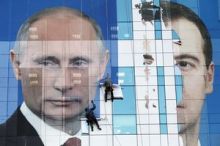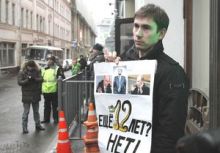Putin has won the campaign, collecting 63.82 percent of votes after 99 percent of the protocols (minutes) had been processed by the territorial election commissions. Administrative resources have once again proved their worth, including falsification, ballot stuffing, and sham requests for additional lists of voters because of continuous work schedule (when a given organization/office is actually closed for the weekend or nonexistent).
Most likely the new administration will resort to cosmetic changes and go through the motions of making reforms, just like their Ukrainian counterpart. Further administrative restrictions – primarily in terms of freedom of speech – are quite possible. To paraphrase the Prague Spring’s noted figure, Zdenek Mlynar (1968), another frost is coming from the Kremlin.
In Moscow-Kyiv relationships one ought to expect wave-like “raids” from Moscow, small- and large-scale trade wars and confrontations involving Customs Union partners, primarily Belarus that has become completely dependent on Moscow. The task remains the same: Ukraine must join the CU come what may, also other CIS entities; its relations with the West must be worsened and its political leadership must be replaced by one that will show a moral loyal attitude to Moscow.
In the forthcoming election campaign in Ukraine, Moscow will take a hostile neutrality stand in regard to the Party of Regions.
“The Russian authorities do not feel the new drive and the new spirit of the age”
Lilia SHEVTSOVA, leading scientist at the Carnegie Moscow Center:
“This presidential election was neither fair nor honest from the very start because of the three factors. Firstly, Putin’s opponents had been assigned by him and are old politician clowns. Secondly, the administrative resource worked for Putin at full blast and the latter, contrary to the legislation, did not even take a leave to campaign. Putin got nearly 75 percent of the television broadcast given to all the candidates. Finally, the election was held according to the repressive legislation that had already eliminated his competitors and opponents. Vote counting was carried out by the commission headed by Churov who had proven as an outstanding falsifier during the parliamentary election in December. That is why nobody expected honest elections.
“It was important for everyone to know how much the vote counting would be falsified. Even now we can see from the outside observations and independent observers that there were a lot of manipulations and rigging. I saw some of them myself; in particular, the so-called ‘carousel’: buses taking dozens and hundreds of people from one polling station to another where they voted not with absentee ballots but with strange lists.
“As for how many votes Putin really received, the estimated number that gives the idea of manipulations and fraud is 47 percent. The association ‘Golos’ [The Vote. – Ed.] calculated that nearly 49 to 50 percent of people voted for Putin. The rest was added to Putin’s box. This number proves that Putin could hardly have won in the first round. However, he preferred the fraud and the crushing victory in the first round to the legitimacy in the second. It is the evidence of another important factor: Putin actually competed with himself in his better days. He focused on the number of 71 percent he had received in 2004 and tried at least to approximate to it. All the rest, especially 50 percent would have looked like his complete defeat in elite’s eyes.”
How will Russia’s relations with the West and Ukraine change?
“First, Putin’s domestic policy will be geared toward internal mobilization and consolidation of society to a much greater extent than before. Now when his power is shaky, when he is going to face huge problems in the country, he will be forced to resort to the old traditional Russian method – identifying an enemy. This is Russian militarism that serves the purpose of self-preservation. He brought it up in the last days before the election and built his electioneering campaign on militarism, enemy searching and stoking hostility inside and outside Russia. And these things will persist. But there is another trend here – personal integration of the Russian ruling class with the West. Incidentally, I can raise the following questions in this context: Where are Putin’s daughters? Where is his property and bank accounts?
“In this case, Putin is unlikely to be turning Russia into North Korea. So he will be walking on the edge of an abyss. On the one hand, there will be a tough authoritarian policy, much tougher than before, and searching for the enemy within. On the other hand, he will be seeking pragmatism and certain compromises with the West. But Mubarak tried to pursue this policy and eventually resorted to utterly cruel repressive mechanisms.”
Will Putin change his attitude to Ukraine, and if so, what will be different?
“I believe that personalistic Russian authorities always find rescue in supporting the myth about a large state, the sphere of its interests and Russia as the center of its own galaxy. In order to have these attributes and boast of them, Russia needs not simply Europe or the US but more down-to-earth objects. That is why I cannot even imagine that Russia-Ukraine relations will reach a more peaceful and constructive dimension. The weaker the Kremlin is, the less predictable and more militaristic – and perhaps cynical and aggressive – its policy with regard to Russia’s neighbors will be.”
Russia isn’t prepared to vote for anyone else because there is no alternative”
The Day asked Olha HERASYMIUK, member of the Ukrainian delegation to PACE, observer during the presidential elections in Russia, to share her impressions on what made this campaign different from others, about the opposition’s moods, and what Ukraine can expect from Putin’s third term.
“These elections were essentially different from last December’s campaign (I was also there as an observer). People were dissatisfied with the outcome of the primaries –and public opinion has changed over the past 12 years. People have a new way of thinking, they want to live in a country with democratic rules and institutions.
“Since then preparations for the elections had been kept in this vein. Those in power did their utmost to oppose this movement… with writers, musicians – all that “rotten intelligentsia” [to quote from Lenin] – taking part in protest rallies, writing articles, and saying they do not want to live in the old stagnant Russia.
“People went to the polling stations because they knew they had to make their choice, even if there was actually no choice. I could also see that even after the elections public moods remained affected by Putin’s arrogant attitude to the Internet community which he called a pack of hamsters and then a pack of traitors to their Fatherland who wanted to expose Russia to the “Orange plague” and State Department (as interpreted by the [Kremlin’s] administration’s spin doctors).
“Despite the nationwide broadcast of Putin’s victory, when he met with his supporters and declared that he had urged them to win this victory and they had won it, that now there is no pessimism in people who want changes, and that now there is an alternative, Putin must realize that he has to do his best to change the situation in Russia, because there is no way to tighten the screws.
“The opposition doesn’t count on any revolutions. There will be a rally on Pushkin Square. I don’t know how it will be organized, considering that the place can’t accommodate many people. The opposition knows that Russian society has yet to get mature, what with an increasing number of people getting access to the Internet and becoming increasingly skeptical about official propaganda. He [Putin] must obviously respond to these moods if the new administration wants to keep Russia under control.”
What about Putin and Zyuganov receiving a total of more than 80 percent of votes?
“This means that Russia isn’t prepared to vote for anyone else because there is no alternative. Not yet. On the other hand, over the past 12 years this political system has formed public support, an electorate that will vote for it. Should Putin step down, everything would fall apart. Who would put it back together? And so a different outcome [of the presidential campaign] would be strange and no one actually expected it.
“As for Prokhorov, people simply don’t accept this new face. He represents big business. All who didn’t want to cast their ballots for Putin or Zyuganov voted for him. Zyuganov traditionally placed second. The communists have long ceased to be an alternative to Putin. They are his collaborators.”
What challenges is Ukraine facing now that Putin’s first words after his victory were: “The CIS is an absolute priority,” and that previously he stressed the need of Ukraine’s customs union membership?
Herasymiuk: “Apparently he will have to continue in the same vein. The Russian administration responds to what is going on in that country and it is alarmed, despite [Putin’s] outwardly convincing victory. Russian society remains disturbed and dissatisfied while the new administration takes over.
“Putin’s imperial plans are clearly formulated: Ukraine must be part of Russia. The fact remains that Ukraine has lost contact with the West and Russia at the same time. This is an absolutely unreasonable government policy. Ukraine must analyze what will happen next. Russia isn’t a monolith. There will be local elections and those of governors. Information about public moods in the members of the Russian Federation varies. Planning to expand an empire by absorbing neighboring countries, while having domestic problems, is easier said than done. While pondering Ukraine’s future, one ought to carefully analyze oneself and plan one’s policy, provided one has enough brains.”
Compiled by Mykola SIRUK, The Day









